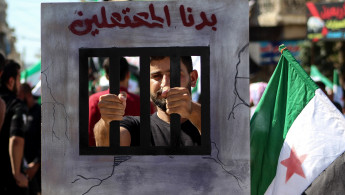Families call for independent body to find Syria's missing 100,000 missing
Syrian family groups have called for the establishment of an international body to look into the cases of the tens of thousands of people missing in Syria.
The Truth and Justice Charter Group published an open letter on Monday calling for the creation of a "victim-centered international body" to search for Syria's forcibly disappeared, along with locating and identifying those who have died in detention.
Since the outbreak of the 2011 Syria war, more than 100,000 people have been forcibly disappeared, the vast majority believed detained by the Assad regime, according to the Syrian Network for Human Rights.
The Truth and Justice Charter Group is made up of 10 survivor and victims' family associations, including Families for Freedom, and has demanded answers on Syria's missing.
"For 12 years Assad’s regime has used mass arbitrary detention and enforced disappearance systematically as a tool to crush dissent and instill a climate fear among Syrians," said Fadwa Mahmoud, a former detainee and co-founder of the Families for Freedom movement.
"We have been waiting years to understand what’s happened to our disappeared loved ones, at the very least we deserve answers."
Mahmoud is the wife of the forcibly disappeared Abdul Aziz Al-Khair and the mother of Maher al-Taha, who both remain missing.
The call for an independent institution looking into the issue has been backed by around 90 NGOs and activist groups while the UN Secretary-General in August 2022 also called for the creation of such a body.
Tens of thousands of people were detained by the Syrian regime in 2011 and 2012 for taking part in pro-democracy protests or suspected criticism of Bashar Al-Assad. Their whereabouts remain unknown.
Many of them are believed to have been executed or died under torture, as the photos of defected military photographer Caesar testify.
Mariam al-Hallak, co-founder of the Caesar Families Association, which is also part of the Truth and Justice Charter, lost her son, Ayham Ghazoul, under similar circumstances in 2012 and welcomed the petition.
"Anyone who has lost a child will tell you it’s one of the most heart-wrenchingly painful experiences you can go through. I waited years to know what happened to Ayham," she said.
"I couldn't grieve as a mother and we couldn’t grieve as a family. Having an international body that can provide answers means families will not have the same agonizing experience that I have been forced to live through."




 Follow the Middle East's top stories in English at The New Arab on Google News
Follow the Middle East's top stories in English at The New Arab on Google News


